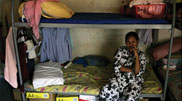 Getty Creative Images
Getty Creative Images
Article
Statistics worldwide show that over two-thirds of all women are abused in their lifetime, but there is hope for victims of violence!
Learn the why behind the headlines.
Subscribe to the Real Truth for FREE news and analysis.
Subscribe NowA pregnant woman sits on a bed, sobbing softly and rubbing her stomach. Her face is marred with bruises and blood trickles from her nose.
As she hears a door slam below, a boy’s small head peeks around her bedroom doorframe. Is he gone? he whispers. Her son rushes into her arms, and she holds him close, her whole body shaking. She did not think she would live to see her son again.
Three times before her husband threatened to kill her, but this time he almost made good on his promise.
Their relationship was not always this way. At first he had been kind, bringing her gifts, occasionally paying visits to her family or stopping by to enjoy a meal. Everyone believed he would make the perfect husband.
It was not until they married that he changed: what began with emotional abuse soon turned physical. His private rage became a way of life for her. Ashamed and afraid, she quickly discovered how to hide the wounds inflicted from the times he hit, pushed, kicked or hurled items at her.
The first time he threatened her life, she finally worked up the courage to tell her family about the assaults, which they quickly dismissed as exaggeration, making her feel even more vulnerable. Without support from relatives, she has given up any hope of escape, nearly numb to the reality of her violent home life.
Yet every time she feels her husband’s wrath, he later apologizes, tearfully begging her to stay, promising to “never do it again.” And time and again, she naively believes his empty promises.
It’s my fault, she thinks while patting her child’s head. I must try harder next time not to upset him for the sake of my children.
The unnamed woman in the scenario depicted could be any one of millions of women who are not alone in their suffering.
From Argentina to Zimbabwe, the situation is similar, with statistics showing that over two-thirds of women worldwide are abused in their lifetime—some of whom suffer in silence until the abuser ultimately takes their life. Shame, humiliation, embarrassment, degradation, anxiety, fear of living alone, a custody battle, danger of escaping, and financial worries often outweigh these women’s wishes to remove themselves and their children from abusive situations.
Worldwide Scourge
Violence against women, also known as gender-based violence, cuts across national boundaries as well as racial, class, religious, traditional and cultural barriers. It limits full participation of women in society.
 Tengku Bahar/AFP/Getty Images
Tengku Bahar/AFP/Getty Images
In 1993, the international community acknowledged this kind of violence when the United Nations General Assembly adopted the Declaration on the Elimination of Violence Against Women, which defines violence against females as “any act of gender-based violence that results in, or is likely to result in, physical, sexual or psychological harm or suffering to women, including threats of such acts, coercion or arbitrary deprivation of liberty, whether occurring in public or in private life.”
The Platform for Action, an agenda for women’s empowerment, expanded this definition at the Fourth World Conference on Women in 1995, during which rape in armed conflict was declared a war crime that could, under certain circumstances, be termed genocide. Several years later, November 25 was set aside as the International Day of Elimination of Violence Against Women.
Overwhelming Numbers
A World Health Organization study about women’s health and domestic violence across 10 countries, revealed the following:
- Between 15 percent and 71 percent of women reported physical or sexual violence by a husband or partner. Many said their first sexual experience was not consensual while 4 percent to 12 percent reported being physically abused during pregnancy.
- About 5,000 women annually are murdered worldwide by family members in the name of “honor.”
- Up to one in five women (and one in 10 men) globally experience sexual abuse as children.
- The practice of forced or child marriages occurs in many countries across Asia, the Middle East and sub-Saharan Africa.
According to the study, limited education of women or their partners, marital conflict, male dominance, economic stress, gender inequality, alcohol and drug use, and restrictive laws on divorce are contributing factors of abuse.
The psychological and emotional effects of abuse on women can be devastating. Women tend to be more empathetic and therefore try to understand the feelings of others, whereas men’s responses typically rely heavily on logic.
Often, this tendency works against women attempting to extricate themselves from a dangerous situation. Dr. Andrzej Urbanik, a researcher who studied the differing reactions of men and women to danger, said, “…when confronted with dangerous situations, men are more likely than women to take action” (BBC).
Trapped in a Violent Cycle
Along with this tendency, women often choose to suffer in secret as they are afraid of the repercussions that such a revelation could bring upon them and their families.
A report by the London Abused Women’s Centre said that often it is when women try to escape the violence that they lose their lives.
“Women are at most risk of being killed by an abusive partner after separation. In Canada, intimate femicides account for between 61% and 78% of all killings of women where an offender is identified. Abusers may also kill the victim’s children, parents, relatives, friends or acquaintances. The perpetrator may also commit murder-suicide.”
In Wales, England, for example, domestic violence is the single biggest killer of women under 35, with reports of violence especially skyrocketing during the Christmas season.
In other societies, women are concerned that they will be ostracized by the community, as it is considered acceptable for a man to beat a woman.
A report issued by Amnesty International said that because Yemeni females are considered second-class citizens, they are less likely to come forward about domestic violence.
“Their rights are routinely violated because Yemeni laws as well as tribal and customary practices treat them as second class citizens,” the report said. “Women are not free to marry who they want and some are forced to marry when they are children, sometimes as young as eight…Once married, a woman must obey her husband and obtain his permission just to leave the house. Women are valued as half the worth of men when they testify in court or when their families are compensated if they are murdered. They are also denied equal treatment when it comes to inheritance and are often denied it completely. Women are dealt with more harshly than men when accused of ‘immoral’ acts, and men are treated leniently when they murder female relatives in ‘honour killings.’ Such discriminatory laws and practices encourage and facilitate violence against women, which is rife in the home and in society at large.”
A Ugandan mother of eight, who was beaten often by her businessman husband, faced similar circumstances. Wife beating was so common in her neighborhood that she knew her friends were enduring it too, but none of them spoke about it.
“My husband would get quite violent with me if he was ever angry or if he didn’t have a good day at the market,” she says. “I would get very upset, but there was no option to leave him or to explain that he was hurting me. Women from my neighbourhood knew what was going on, but it was so regular that it was kind of accepted” (The Guardian).
Last year, Ugandan daily newspaper, The New Vision reported that at least 72 percent of women in Mubende District, which has a population of over 430,000, were sexually abused and another 28 percent were raped.
Some cultures even teach that women should feel unloved if their husbands do not beat them!
A Zambian actor’s wife recently spoke to BBC News about a time her husband beat her. Surprisingly, when she called the police, they urged her not to pursue the incident. She received the same reaction from her doctor and several of her friends.
Her husband said that the reason for the beating was a result of cultural traditions in Zambia.
“To be a man, you need to discipline a woman, give her a slap or two,” he said. “You know, in our culture, it’s OK because that’s how we feel we love our women” (ibid.).
Unbelievably, others agreed with him!
The article reported that “more than half of Zambian women have suffered domestic abuse but cases rarely come to light because of the stigma attached to speaking out. Young women are taught by their elders to accept punishment from their husbands when they are disobedient. Even cooking a bad meal warrants a smack.”
But this attitude of violence is not only held in less developed nations—it is a global scourge that also affects the West, as exemplified in a story by Houston television news station KHOU.
“In March 2006, Arcely Gomez was pregnant with her fourth child, when her husband shot her in the face. The husband was angry because Gomez wanted to take the couple’s three children and leave, so he decided to kill her, then himself. But miraculously, Gomez survived.
“She gave birth to her fourth child and began working at carnivals around town to make ends meet.
“Then another tragedy struck.
“Six months ago Gomez’s cousin, Fortunada Cardenas, was murdered by her boyfriend. The boyfriend shot Cardenas, then committed suicide—all in front of the children who were suddenly left without a mother.”
According to the United States National Crime Victimization Survey, and the most recent statistics, 232,960 women in the U.S. were raped or sexually assaulted in 2006—more than 600 every day! In addition, the National Violence Against Women Survey reported that on average about 1.5 million American women are raped and/or physically assaulted by an intimate partner annually.
Human Effort
To combat this global pandemic, UN Secretary-General Ban Ki-moon launched the Network of Men Leaders. It includes current and former politicians, activists, actors, and religious and community figures including Archbishop Desmond Tutu, the South African Nobel Peace Laureate.
Mr. Ban also issued two new reports. One focused on the intensification of efforts to eliminate all forms of violence against women, including increased coordination and collaboration among entities of the United Nations and enhanced support for national efforts to address the issue, and the other dealing specifically with violence against female migrant workers.
Additionally, on its site, the UN pledged by 2015 to:
- Adopt and enforce national laws to address and punish all forms of violence against women and girls.
- Implement multi-sectoral national action plans.
- Strengthen data collection on the prevalence of violence against women and girls.
- Increase public awareness and social mobilization.
- Address sexual violence in conflict.
“Our goal is clear,” Mr. Ban said during a speech on the International Day of Elimination of Violence Against Women in 2009, “an end to these inexcusable crimes—whether it is the use of rape as a weapon of war, domestic violence, sex trafficking, so-called ‘honour’ crimes or female genital mutilation/cutting. We must address the roots of this violence by eradicating discrimination and changing the mindsets that perpetuate it.”
But for women who live in constant danger, manmade efforts cannot provide a solution quickly enough.
As the mother described earlier tucks her little one into bed, she wonders, Where is God in all of this?
Biblical View
Some people believe that God—and His Word—support violence against women. This is absolutely false! He never intended for women to suffer violence.
Genesis 5:1-2 states, “In the day that God created man, in the likeness of God made He him; male and female created He them; and blessed them.” Both man and woman were created in the image of God.
In Genesis 2:18, God reveals His intended role for a woman: she was created to complement man. This does not mean she is inferior, but signifies the role she was designed to fulfill—that of providing what a man lacks.
When they sinned, God punished them both. But this did not reduce women to second-class status, nor did it authorize men to treat them harshly.
The Old Testament is filled with examples of women such as Miriam, Rebekah, Rahab, Rachel, Deborah, Esther, Hannah, Ruth and Sarah among others, who played decisive roles in ancient Israel’s history.
Men were intended to exercise leadership in their family and the community. But by no stretch does this mean that they should mistreat women.
Galatians 3:26-29 clearly states, “For you are all the children of God by faith in Christ Jesus. For as many of you as have been baptized into Christ have put on Christ. There is neither Jew nor Greek, there is neither bond nor free, there is neither male nor female, for you are all one in Christ Jesus. And if you be Christ’s, then are you Abraham’s seed, and heirs according to the promise.”
Put simply, God offers salvation to all, both women and men.
In the New Testament, women such as Mary, Dorcas, Lydia, Phoebe, Tryphena and Tryphosa, Priscilla and a host of others played roles in the Church. The fact that Jesus first appeared to women after His Resurrection is further evidence that God holds women in high esteem. (See Matthew 28:1, 5-10; Acts 1:13-14, 9:36, 16:14; Romans 16:1-16.)
When man discriminates or commits any act of violence against a woman, he is acting contrary to the Word of God.
What God Says
In His Word, God instructs husbands to love their wives—not treat them as slaves. “Husbands, love your wives, even as Christ also loved the church, and gave Himself for it…So ought men to love their wives as their own bodies. He that loves his wife loves himself. For no man ever yet hated his own flesh; but nourishes and cherishes it, even as the Lord the church” (Eph. 5:23-29).
Men are to honor their wives (I Pet. 3:7). This means to show high respect or esteem. “Likewise, you husbands, dwell with them according to knowledge, giving honor unto the wife, as unto the weaker vessel…that your prayers be not hindered.”
God’s Word is plain. He does not even listen to the prayers of an abusive husband!
In addition, the Bible instructs: “Husbands, love your wives, and be not bitter against them” (Col. 3:19).
Honoring one’s wife excludes and forbids humiliation or physical or emotional violence. This applies to every female—including all mothers, daughters, wives and sisters.
These words should comfort women trapped in the relentless cycle of violence.
Help lines, shelters, non-profit programs, safe houses, support groups and government agencies can only do so much. Although well-intentioned, these efforts—as well as the laws of men—will never erase the problem and the underlying attitude behind the violence.
Scriptures outlining the correct roles for men and women are not just suggestions. They are God’s laws, which, if applied, will bring happiness, productivity and peace. But they are not just words on a page—they must be applied!
Only then can the cry of abused women cease.
Under God’s Law, a husband and wife can truly lead happy lives and form a productive team, ready to tackle life’s problems. To learn more read David C. Pack’s booklet You Can Build a Happy Marriage.



